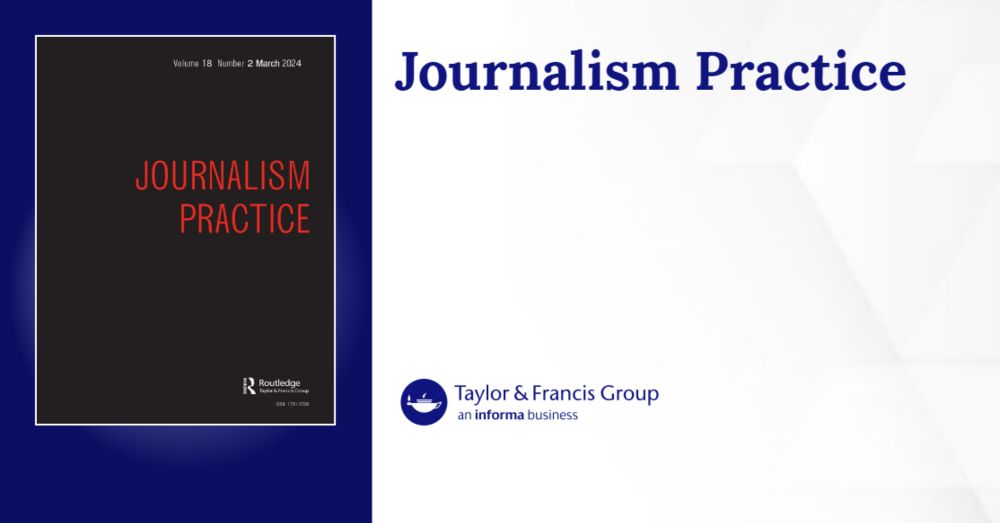Interested? Or curious to hear more? Send me an email at a.l.fleerackers [at] uva [dot] nl
(And please share, share, share 💚🙏💚)
13.01.2026 14:46 — 👍 0 🔁 0 💬 0 📌 0
If you take part, we'd invite you to answer some questions about your experiences as a journalist who covers climate in an interview taking 30-60 min.
We can offer you a 25 euro gift card in thanks for your time.
13.01.2026 14:34 — 👍 0 🔁 0 💬 1 📌 0
The project examines journalists' experiences reporting climate stories and their perceptions of “solutions journalism.” But even climate journalists who have never used, or even heard of, solutions journalism are welcome to participate
13.01.2026 14:34 — 👍 0 🔁 0 💬 1 📌 0

Poster with the University of Amsterdam logo and the text "Are you a freelance journalist who covers climate change in the Netherlands? We'd love to hear from you"
Please help spread the word! We are looking for freelancers to participate in an interview for our research project "Engaging citizens with sustainable solutions."
If you fit the bill, or know someone who does, please read on (details in 🧵👇)
#envirocomm #scicomm
13.01.2026 14:34 — 👍 1 🔁 1 💬 1 📌 0
Call for presentations: If you're planning to be at #ICA2026 and are interested in #scicomm, please join us for this exciting preconference!
Details below 👇👇👇
10.12.2025 08:24 — 👍 1 🔁 0 💬 0 📌 0
Only a week to go before our webinar on "watchdog science journalism"! Will we see you there?
05.11.2025 16:11 — 👍 2 🔁 1 💬 0 📌 0
Come join us for a discussion of how science journalists can act as watchdogs of the research sphere!
#scicomm #journalism
30.10.2025 08:48 — 👍 6 🔁 2 💬 0 📌 0
Such a pleasure to speak with INCT-CPCT about our recent research on how science journalists navigate predatory publishing
study w/ @juancommander.scholcommlab.ca & @lauramoorhead.bsky.social available here: www.tandfonline.com/doi/full/10....
30.10.2025 08:47 — 👍 3 🔁 2 💬 0 📌 0
Great opportunity to work with a vibrant and international team, and to make a difference for #openscience and public knowledge.
01.10.2025 06:09 — 👍 2 🔁 0 💬 0 📌 0
Story by the wonderful @naseemmiller.bsky.social , research by the wonderful @juancommander.scholcommlab.ca and @lauramoorhead.bsky.social
01.10.2025 06:02 — 👍 1 🔁 1 💬 0 📌 0

Poster advertising "Pub Talk," including illustration of a face and a bunch of digital devices and phones and details of the event: Speakers: Prof Mark Deuze, Dr Alice Fleerackers, Dr Toni Pape When/where: Sep 30, 16:30-18:30, Vox-Pop
If you're in Amsterdam and interested in digital media (or just want to leave your house on Monday), come say hi at this FREE event.
@markdeuze.bsky.social , Toni Pape & I will be talking about the weird and sometimes wonderful nature of living life online.
voxpop.uva.nl/en/content/e...
25.09.2025 05:37 — 👍 3 🔁 0 💬 0 📌 0
🐕 🐕 🐕 REMINDER 🐕 🐕 🐕
The deadline to submit an abstract to our special issue on "Journalism as a Science Watchdog" is just a couple of weeks away (October 15).
We are really looking forward to reading your submissions!
19.09.2025 18:24 — 👍 3 🔁 0 💬 0 📌 0
Interested in researching how journalists experience and grapple with emotions? And how nature retreats might help them better manage the impacts of covering evolving crises?
Come work at the @uvahumanities.bsky.social with the wonderful @johana.bsky.social 👇👇👇
18.09.2025 13:01 — 👍 3 🔁 0 💬 0 📌 0
I would love to see more research on this topic!
04.09.2025 12:17 — 👍 0 🔁 0 💬 0 📌 0
Reflecting on this thread, I am laughing at the extreme irony of the glaring capitalization error in the title of our paper 😂
Definitely a sign our research is not to be trusted.
04.09.2025 10:00 — 👍 5 🔁 0 💬 0 📌 0
The findings are also problematic from a diversity perspective, as they suggest research from smaller, lesser-known, OA journals, and published by researchers whose first language is not English, may remain hidden from public view.
04.09.2025 09:51 — 👍 1 🔁 0 💬 1 📌 0
Who is Actually Harmed by Predatory Publishers?
| tripleC: Communication, Capitalism & Critique. Open Access Journal for a Global Sustainable Information Society
The findings are concerning, because some of these strategies are unlikely to help journalists weed out problematic research.
(See @eve.gd & @ernestopriego.com's great paper on the problems of judging the "container" research is published in: www.triple-c.at/index.php/tr...)
04.09.2025 09:51 — 👍 2 🔁 2 💬 1 📌 0
Beyond the reputation and impact factor of a journal, some journalists saw typos/grammar mistakes were "red flags."
Others equated #openaccess with predatory, expressing suspicion about any journal that was free to read.
04.09.2025 09:51 — 👍 0 🔁 0 💬 1 📌 1

Quote from journalist: "I vet research largely by the publication that it's in. So, if it's in a weird publication, I sort of don't know whether to trust it or not. I usually don't, because...I'm like, well it would be in a better publication if it were trustworthy."
That gut feeling hinged largely on markers of prestige, impact, and familiarity.
Some journalists, like this one, said they would never report on research from an unfamiliar journal:
04.09.2025 09:51 — 👍 1 🔁 1 💬 1 📌 0
Many journalists were unaware of these journals.
Others knew about them but were unconcerned: The journals were a problem in theory, or for their colleagues, but not a problem for them.
With years of experience, they said they had developed a "gut instinct" for telling "good" from "bad" journals.
04.09.2025 09:51 — 👍 1 🔁 0 💬 1 📌 0
In the study, we interviewed 23 science, health, and environmental journalists from Europe and North America.
We asked about their perceptions of predatory journals, and what strategies they used to decide if a journal is trustworthy.
04.09.2025 09:51 — 👍 1 🔁 0 💬 1 📌 0

Screenshot of journal article titled "I'd like to think I'd be able to spot one": How journalists navigate predatory journals
Authors: Alice Fleerackers, Laura Moorhead, Juan Pablo Alperin
Have you ever heard of predatory journals?
Our new study—published this week in Journalism Practice—suggests many science journalists haven't.
When they were familiar with predatory journals, most said they weren't worried, confident they'd "be able to spot one if they saw one."
Details in 🧵👇
04.09.2025 09:51 — 👍 22 🔁 13 💬 2 📌 4
Grateful to see our work on Watchdog Science Journalism featured in @epstoa.bsky.social
Reminder if you're a researcher interested in this space, our special issue for Media and Communication is accepting submissions till October 1!
www.cogitatiopress.com/mediaandcomm...
01.09.2025 06:50 — 👍 1 🔁 1 💬 0 📌 0
Exactly.
20.08.2025 15:11 — 👍 0 🔁 0 💬 0 📌 0
But they do not bode well for the future of local (climate) news outlets, who rely heavily on republishing The Conversation stories... but almost never receive any Facebook attention.
19.08.2025 16:56 — 👍 0 🔁 0 💬 1 📌 0
Clinician–writer. A humanities-based project exploring story and identity. Honoring chosen names and lived identities. Interested in where explanation helps and where naming begins to do harm. drmonicaross.com 🏳️🌈
Science at The Times
My book, about the radio war: https://www.amazon.co.uk/dp/1787634132?ref_=cm_sw_r_apin_dp_NPXKFD6KQ3B2P603N1ZN
Professor, mom, consummate doom scroller. Currently Vice-Provost, Teaching and Learning at McMaster University. kimdej.com Sometimes spotted with @lorenking.org
PhD bioengineering, BS civil engineering, human health, sustainability, data science, bioinformatics, metabolomics. Opinions are my own. (he/him)
Open access, scholarly communications journal for research about contemporary publishing practices. Co-edited by Alyssa Arbuckle and Janneke Adema supported by University of Michigan Press
https://journals.publishing.umich.edu/jep/
Reader. Writer. Prof. of French and Visual Culture. Currently writing a book about Theo Bros, Tech Bros, the Protestant Reformation and the New Right.
She/her | First-gen 🎓🏳️🌈 | Postdoc at the Centre for Journalism @sdu.dk | PhD from @ipk-univie.bsky.social | news use & avoidance ❌📰 constructive journalism 🌱🗞️ climate change 🌎 political marketing 👩💼 polcom & journalism studies
Welcome to the real world. Prik door de waan van de dag en zie wat er schuilgaat achter de ontwikkelingen van vandaag.
https://t.mtrbio.com/tegenlicht
Assistant Professor in Media Studies at the University of Copenhagen • Fields of expertise: Social media (and) journalism, news diversity, Eurovision •🇧🇪 in 🇩🇰
Professor of Journalism Studies, Vrije Universiteit, Amsterdam, Netherlands. About me: https://damiantrilling.net . Our group is here: @journstudiesvu.bsky.social and here: https://vu.nl/en/about-vu/faculties/faculty-of-humanities/more-about/journalism
Political scientist studying social media, misinformation & elections at McGill
Award-winning Science events for kids. Founded Ireland☘️ Scientist, Mum, speaker United Nations 🇺🇳 Franchise owners bring hands-on, STEM fun Ireland 🇮🇪 UK 🇬🇧 Canada 🇨🇦 Saudi Arabia 🇸🇦International School Licience. Franchise. junioreinsteinsscienceclub.com
Head Writer at NGO Aid Watch. Communications Specialist for NGOs. Former Oxfam, Red Cross & others. Seen on CNBC, Al Jazeera, BBC News and more. Coffee please!
Ethicist based @Northwestern University, Chicago
Science writer for Michigan News at the University of Michigan. Big, big agate fan (the Lake Superior kind). Soft spot for fish and plants, esp the native ones.
Director of the Centre for Culture and Evolution, Brunel University London @brunelcce.bsky.social. President of the European Human Behaviour and Evolution Association @ehbea.bsky.social
https://www.rebeccasear.org/
I am a Ukrainian scientist and the Vice-Rector for Scientific Work at Berdyansk State Pedagogical University. My interests include materials science, nanotechnology, STEM education, AI in science, general issues of science, psychology, and education.
Research Fellow examing the nexus of AI + geopolitics + data ethics. Prioritising Indigenous knowledge. After hours it's Latin dancing & cycling.
Me gusta el verde 🌿 Creo en la participación social como motor de cambio 🙌🏼 Coordinadora del @ccsupf.bsky.social Profesora en @upf.edu y @bsm-upf.bsky.social Desde 2020, Dra 🎓
Open Science, Repetitive Research, Research on research; likes repetition, likes repetition
https://replicationresearch.org/







